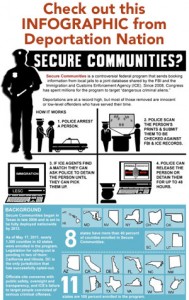(English → Español) View originalTranslators:
Source: Latino Justice, PRLDEFke4yz63i5dr4boo6sduyk4o768m6h68c
The majority of people arrested in a fast-growing federal immigration enforcement program are jailed without bond, without access to a lawyer, and without a court hearing, according to a new report.ijfnho07cb1riqt7ns1m4sjfw6otq2zs
Secure Communities by the Numbers: An Analysis of Demographics and Due Process finds that the Secure Communities program has led to thousands of wrongful arrests of U.S. citizens, while tens of thousands of families are split apart.zncw6mjkgnr8q16ko2nte8682fnafc9a
The report, released by the Chief Justice Earl Warren Institute on Law & Social Policy at UC Berkeley School of Law, is a first-ever in-depth analysis of Secure Communities data obtained through the Freedom of Information Act. Secure Communities relies on local law enforcement to target noncitizens for deportation. 7p8e2rx3sgl2a10eqf7zxnb5k280c4q6Fingerprints from individuals booked into local jails—many on minor infractions—are sent to the Department of Homeland Security for an immigration check, triggering arrests. This has transformed the enforcement landscape by allowing U.S. Immigration and Customs Enforcement (ICE) agents to effectively run federal immigration checks on everyone booked into a local jail.sohds98lqrbfc2v1qq9e7ukazi38s58i
“The results are disturbing because they point to a system that is funneling people towards deportation without due process. Based on our findings, we recommend that the Department of Homeland Security suspend the program until the government addresses the issues we identify, particularly wrongful U.S. qma7sh2093sjn4a8pj63n8nk5n4esgvecitizen arrests, potential racial profiling, and lack of discretion in detention,” said Aarti Kohli, director of immigration policy at the Warren Institute and lead author of the report.8pr1jxqrtn85jz02l5uwj2q6ese0axba
Lisa Chavez, Senior Research Associate at the Warren Institute and a co-author adds, “We had unprecedented access to federal data on ICE arrests, detentions, and deportations of people who are pulled in through Secure Communities. By following the numbers, we were able to construct a picture of who is being arrested and what happens to them after their immigration arrest.”d0ocdbk21whp9lawsnrxotqrbjgzz1rv
Key findings include:gnlzth0dby3yf59i1v1irl78nq0bovag
-
Approximately 3,600 United States citizens have been arrested by ICE through the Secure Communities program even though citizens, by definition, should not be subject to immigration detention;efmpk56jzudrsbq2d6u94kp9ihzh9usp
-
Approximately 88,000 families containing U.S. citizens have been affected by Secure Communities through the immigration arrest of a family member;9zghdpbsnnlzl8n1n1dn2mca5j5bn25j
-
Latinos comprise 93% of individuals arrested through Secure Communities though they only comprise 77% of the undocumented population in the United States; tuubqwz4988txhhdarmsmc31zzqubq0j
-
Only 52% of individuals arrested through Secure Communities were slated to appear before an immigration judge;75imrk9jp3iqmjb7jkgq92zm9agtayyg
-
Only 24% of the individuals arrested through Secure Communities who did have an immigration hearing were represented by an attorney. By contrast, 40% of all immigration court respondents have counsel;x8fxt4pvfn8pmpv9a8e1gkks13dvf0tp
-
Only 2% of non-citizens arrested through Secure Communities are granted relief from deportation by an immigration judge. By contrast, 14% of all immigration court respondents are granted relief;y67gl9zqyxdc27su1ilgu0nh81lsuji0
-
A large majority (83%) of people arrested through Secure Communities is held in ICE detention as compared with an overall DHS immigration detention rate of 62%. ICE does not appear to be exercising discretion when deciding whether or not to detain Secure Communities arrestees.f0mj1bbnbvin3y19ci0clmhu7vvh1icy
“The wrongful arrest of thousands of U.S. citizens demonstrates that, too often, ICE’s protocol is arrest first, investigate second. This flies zr2hdp0oa5r41wr3dc0wslrn27uv5gx5
in the face of the Constitution. With these numbers finally public, ICE must confront the deep flaws in the program that have led to these wrongful arrests and to the disproportionate targeting of young Latino men,” said professor Peter L. Markowitz, director of the Kathryn O. Greenberg Immigration Justice Clinic at Cardozo School of Law, a co-author of the report.kch89pz91xy0lruaswqase0ig3ngf6a8
The data of the Immigration and Customs Enforcement agency’s Secure Communities program was obtained through partial settlement of a Freedom of Information Act lawsuit filed by the Cardozo Immigration Justice Clinic and the Center for Constitutional Rights (CCR) on behalf of the National Day Labor Organizing Network (NDLON).13duo5zbzezu40ora7gmbpsch9lf2bs7
“The government’s own data has consistently shown that most of the people impacted by this program have no criminal record or are low-level offenders. To lock these people up in detention centers without access to attorneys or an opportunity to see a judge is undemocratic,” said Kohli.a9jt53r86sxnr7xbn7ne2c51fnq2j7k9
The report makes a number of recommendations, including:1grsfjnxpiv3dyuzagh6n9mm1na8gs8e
-
Increasing transparency of the program;g5dlwbbkhj68be067g7yvcxy3xop8bqg
-
Adding safeguards to prevent U.S. citizen arrests;q7sqmp3ak4238zgt22neo1ukucrcvggt
-
Investigating the evidence of racial profiling of Latinos;uyakga1jfvdfsyftnj3mi691ofel8fh1
-
Providing access to government-appointed legal counsel; and4ekpp0fxmloh1ibloe1gq8a3hblbikmu
-
Suspending the program until these recommendations are addressed.yiaq247cyflnm1tvled52by6attl0fp0
Here is Julia Preston’s article in the New York Times on the report.s5yvqoy12525grkrljrmduxa2y6nmhlo
Access the report: Secure_Communities_by_the_Numbers.9smagfnk6eavmu3df0t7g0urtu7hqdy7
xjn49jh7y5ge5w63tgcn1ijn2kmllg4ho2z8zja7qs16ihwjjaj4lq21010o3adh
xjn49jh7y5ge5w63tgcn1ijn2kmllg4ho2z8zja7qs16ihwjjaj4lq21010o3adh
(original) View Español translation
Source: Latino Justice, PRLDEF
The majority of people arrested in a fast-growing federal immigration enforcement program are jailed without bond, without access to a lawyer, and without a court hearing, according to a new report.
Secure Communities by the Numbers: An Analysis of Demographics and Due Process finds that the Secure Communities program has led to thousands of wrongful arrests of U.S. citizens, while tens of thousands of families are split apart.
The report, released by the Chief Justice Earl Warren Institute on Law & Social Policy at UC Berkeley School of Law, is a first-ever in-depth analysis of Secure Communities data obtained through the Freedom of Information Act. Secure Communities relies on local law enforcement to target noncitizens for deportation. Fingerprints from individuals booked into local jails—many on minor infractions—are sent to the Department of Homeland Security for an immigration check, triggering arrests. This has transformed the enforcement landscape by allowing U.S. Immigration and Customs Enforcement (ICE) agents to effectively run federal immigration checks on everyone booked into a local jail.
“The results are disturbing because they point to a system that is funneling people towards deportation without due process. Based on our findings, we recommend that the Department of Homeland Security suspend the program until the government addresses the issues we identify, particularly wrongful U.S. citizen arrests, potential racial profiling, and lack of discretion in detention,” said Aarti Kohli, director of immigration policy at the Warren Institute and lead author of the report.
Lisa Chavez, Senior Research Associate at the Warren Institute and a co-author adds, “We had unprecedented access to federal data on ICE arrests, detentions, and deportations of people who are pulled in through Secure Communities. By following the numbers, we were able to construct a picture of who is being arrested and what happens to them after their immigration arrest.”
Key findings include:
-
Approximately 3,600 United States citizens have been arrested by ICE through the Secure Communities program even though citizens, by definition, should not be subject to immigration detention;
-
Approximately 88,000 families containing U.S. citizens have been affected by Secure Communities through the immigration arrest of a family member;
-
Latinos comprise 93% of individuals arrested through Secure Communities though they only comprise 77% of the undocumented population in the United States;
-
Only 52% of individuals arrested through Secure Communities were slated to appear before an immigration judge;
-
Only 24% of the individuals arrested through Secure Communities who did have an immigration hearing were represented by an attorney. By contrast, 40% of all immigration court respondents have counsel;
-
Only 2% of non-citizens arrested through Secure Communities are granted relief from deportation by an immigration judge. By contrast, 14% of all immigration court respondents are granted relief;
-
A large majority (83%) of people arrested through Secure Communities is held in ICE detention as compared with an overall DHS immigration detention rate of 62%. ICE does not appear to be exercising discretion when deciding whether or not to detain Secure Communities arrestees.
“The wrongful arrest of thousands of U.S. citizens demonstrates that, too often, ICE’s protocol is arrest first, investigate second. This flies
in the face of the Constitution. With these numbers finally public, ICE must confront the deep flaws in the program that have led to these wrongful arrests and to the disproportionate targeting of young Latino men,” said professor Peter L. Markowitz, director of the Kathryn O. Greenberg Immigration Justice Clinic at Cardozo School of Law, a co-author of the report.
The data of the Immigration and Customs Enforcement agency’s Secure Communities program was obtained through partial settlement of a Freedom of Information Act lawsuit filed by the Cardozo Immigration Justice Clinic and the Center for Constitutional Rights (CCR) on behalf of the National Day Labor Organizing Network (NDLON).
“The government’s own data has consistently shown that most of the people impacted by this program have no criminal record or are low-level offenders. To lock these people up in detention centers without access to attorneys or an opportunity to see a judge is undemocratic,” said Kohli.
The report makes a number of recommendations, including:
-
Increasing transparency of the program;
-
Adding safeguards to prevent U.S. citizen arrests;
-
Investigating the evidence of racial profiling of Latinos;
-
Providing access to government-appointed legal counsel; and
-
Suspending the program until these recommendations are addressed.
Here is Julia Preston’s article in the New York Times on the report.
Access the report: Secure_Communities_by_the_Numbers.


















